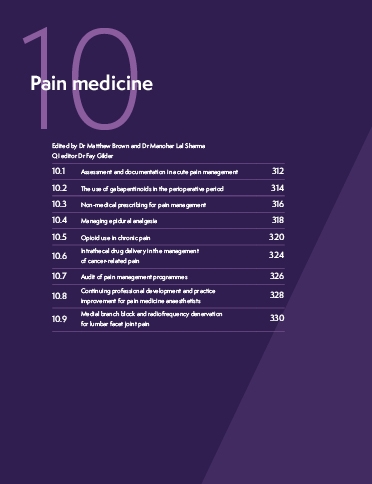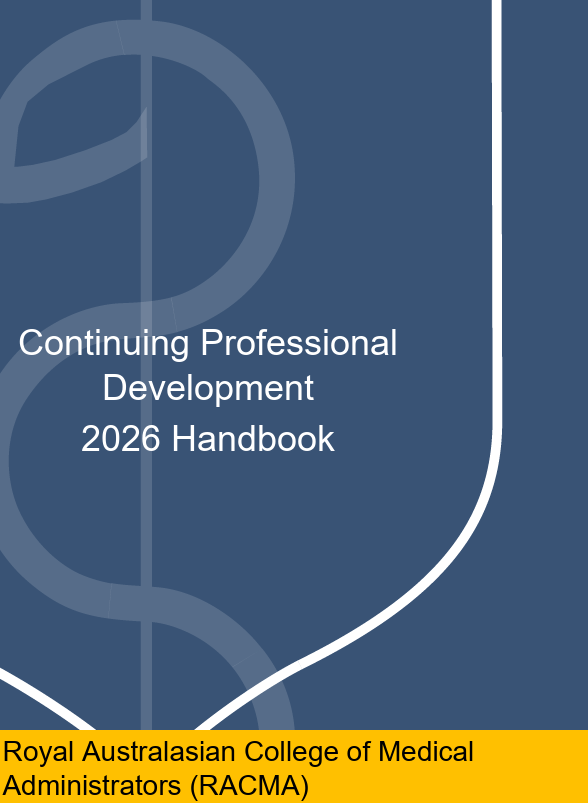
Activity: Practice audit (clinical support) Practice evaluation - Measuring outcomes
Guide index
 Library > Library guides > Professional development hub > ANZCA and FPM CPD Program
Library > Library guides > Professional development hub > ANZCA and FPM CPD Program
 Category 1: Practice evaluation
Category 1: Practice evaluation
 Category 2: Knowledge & skills
Category 2: Knowledge & skills
***
The Royal College of Anaesthetists (RCoA) has developed a publication titled Raising the Standards: RCoA quality improvement compendium, which provides examples of achievable audits focused mainly on measurement against defined process standards.
ANZCA gratefully acknowledges the RCoA’s willingness to make this document available for our participants. Ready-to-use audit topics and samples relevant to clinical care are presented as a series of chapters (which include perioperative care, pain medicine, intensive care medicine).
 Raising the Standards: RCoA Quality Improvement Compendium, 4e
by
The Quality Improvement Compendium, previously known as the Audit Recipe Book, provides a manual of quality improvement (QI) and audit tools for anaesthetists.
Raising the Standards: RCoA Quality Improvement Compendium, 4e
by
The Quality Improvement Compendium, previously known as the Audit Recipe Book, provides a manual of quality improvement (QI) and audit tools for anaesthetists.
 Chapter 10 - Pain Medicine, Raising the Standards: RCoA Quality Improvement Compendium, 4e
by
The Quality Improvement Compendium, previously known as the Audit Recipe Book, provides a manual of quality improvement (QI) and audit tools for anaesthetists.
Chapter 10 - Pain Medicine, Raising the Standards: RCoA Quality Improvement Compendium, 4e
by
The Quality Improvement Compendium, previously known as the Audit Recipe Book, provides a manual of quality improvement (QI) and audit tools for anaesthetists.
The Royal Australasian College of Medical Administrators (RACMA) in their “Continuing Professional Development Handbook” include guidance on auditing outcomes of own practice or that of your organisation.3 They outline steps for audits and provide suggestions about audits and relevant standards and indicators.
ANZCA gratefully acknowledges the RACMA’s willingness to make this document available for our participants.
 Continuing Professional Development 2026 Handbook
by
This handbook describes RACMA's CPD program and provides examples of the types of activities that we believe will help you in your professional development. The range of activities that are suitable for CPD is very wide and the suggestions in this handbook are not exhaustive. We encourage you to design and undertake the activities which will be of most benefit for your particular professional development needs.
Continuing Professional Development 2026 Handbook
by
This handbook describes RACMA's CPD program and provides examples of the types of activities that we believe will help you in your professional development. The range of activities that are suitable for CPD is very wide and the suggestions in this handbook are not exhaustive. We encourage you to design and undertake the activities which will be of most benefit for your particular professional development needs.
The Medical Council of New Zealand website includes some examples of audits relevant to clinical support or practice without direct patient care.

 A Best Practice Guide for Continuous Practice Improvement
by
This Guide is a framework for use when developing or reviewing programmes set up to demonstrate the competence and performance of medical specialists. The Best Practice Guide was produced as a joint project between the Council of Medical Colleges (CMC) and Member Colleges, the Medical Council of New Zealand (MCNZ), the Ministry of Health (MoH) and District Health Board (DHB) Chief Medical Officers.
A Best Practice Guide for Continuous Practice Improvement
by
This Guide is a framework for use when developing or reviewing programmes set up to demonstrate the competence and performance of medical specialists. The Best Practice Guide was produced as a joint project between the Council of Medical Colleges (CMC) and Member Colleges, the Medical Council of New Zealand (MCNZ), the Ministry of Health (MoH) and District Health Board (DHB) Chief Medical Officers.
 Best Practice in Clinical Audit
by
This document is the result of wide consultation and workshops with clinicians, service managers, and clinical audit staff, as well as representatives of a range of professional bodies including the Academy of Medical Royal Colleges.
Best Practice in Clinical Audit
by
This document is the result of wide consultation and workshops with clinicians, service managers, and clinical audit staff, as well as representatives of a range of professional bodies including the Academy of Medical Royal Colleges.
 A Guide to Using Data for Health Care Quality Improvement
by
A Guide to Using Data for Health Care Quality Improvement
by
 The How-to Guide for Measurement for Improvement
by
This guide is designed to help you to this in your improvement projects. It is in two parts.
Part 1 explains what measurement for improvement is and how it differs from other sorts of measurement that you will have come across.
Part 2 talks you through the process of collecting, analysing and reviewing data. If you are familiar with the Model for Improvement and how to use it, you can skip Part 1 and go straight to Part 2.
The How-to Guide for Measurement for Improvement
by
This guide is designed to help you to this in your improvement projects. It is in two parts.
Part 1 explains what measurement for improvement is and how it differs from other sorts of measurement that you will have come across.
Part 2 talks you through the process of collecting, analysing and reviewing data. If you are familiar with the Model for Improvement and how to use it, you can skip Part 1 and go straight to Part 2.
 National Safety and Quality Health Service Standards, 2e
by
The National Safety and Quality Health Service (NSQHS) Standards were developed by the Australian Commission on Safety and Quality in Health Care (the Commission) in collaboration with the Australian Government, states and territories, the private sector, clinical experts, patients and carers. The primary aims of the NSQHS Standards are to protect the public from harm and to improve the quality of health service provision. They provide a quality assurance mechanism that tests whether relevant systems are in place to ensure that expected standards of safety and quality are met. There are eight NSQHS Standards, which cover high-prevalence adverse events, healthcareassociated infections, medication safety, comprehensive care, clinical communication, the prevention and management of pressure injuries, the prevention of falls, and responding to clinical deterioration. Importantly, these NSQHS Standards have provided a nationally consistent statement about the standard of care consumers can expect from their health service organisations.
National Safety and Quality Health Service Standards, 2e
by
The National Safety and Quality Health Service (NSQHS) Standards were developed by the Australian Commission on Safety and Quality in Health Care (the Commission) in collaboration with the Australian Government, states and territories, the private sector, clinical experts, patients and carers. The primary aims of the NSQHS Standards are to protect the public from harm and to improve the quality of health service provision. They provide a quality assurance mechanism that tests whether relevant systems are in place to ensure that expected standards of safety and quality are met. There are eight NSQHS Standards, which cover high-prevalence adverse events, healthcareassociated infections, medication safety, comprehensive care, clinical communication, the prevention and management of pressure injuries, the prevention of falls, and responding to clinical deterioration. Importantly, these NSQHS Standards have provided a nationally consistent statement about the standard of care consumers can expect from their health service organisations.
 Public Reporting of Safety and Quality in Public and Private Hospitals: Literature Review and Environment Scan
by
This report provides a summary of findings from a literature review and environment scan undertaken to inform options for national public reporting standards of safety and quality in health care across public and private hospitals in Australia.
Public Reporting of Safety and Quality in Public and Private Hospitals: Literature Review and Environment Scan
by
This report provides a summary of findings from a literature review and environment scan undertaken to inform options for national public reporting standards of safety and quality in health care across public and private hospitals in Australia.


Anaesthesia-specific tools
MATE (Measure for the Anaesthesia Theatre educational Environment) for teaching in the OR:
ACLEI (Anaesthesia Clinical Learning Environment Instrument) for overall anaesthesia learning environment:
Pain medicine- specific tools
Dutch Residency Educational Climate Test (D-RECT):
Post-graduate Hospital Educational Environment Measure (PHEEM):
Learn@ANZCA (formerly Networks) is the college's learning management system.
 Note: Some resources located in Learn@ANZCA require that you first register before accessing.
Note: Some resources located in Learn@ANZCA require that you first register before accessing.



This toolkit contains six documents to assist you in performing a local gender equity survey:
 Environmental Sustainability Audit Tool
by
Environmental Sustainability Audit Tool
by


Quick links
About ANZCA
Copyright © Australian and New Zealand College of Anaesthetists.